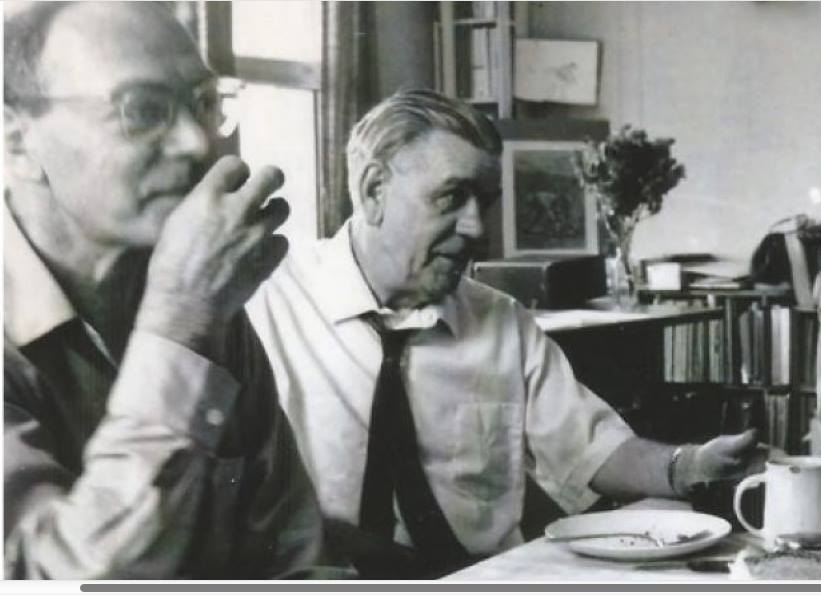Paul Mattick Sr. (1904–1981), who left Germany for the US when he was 22, shown here with Chomsky’s mentor, the linguist Zellig Harris (to his right).
Mattick saw the revolutions in Russia and China as ‘not proletarian revolutions in the Marxist sense, leading to the “association of free and equal producers”, but state-capitalist revolutions, which were objectively unable to issue into socialism’. ‘Marxism served here as a mere ideology to justify the rise of modified capitalist systems, which were no longer determined by market competition but controlled by way of the authoritarian state.’ (From his introduction to Anti-Bolshevik Communism)
Gary Roth’s biography of Mattick makes it unmistakably clear that Mattick’s working-class origins and background in Germany were pivotal to his politics and stayed with him throughout his life. Trained as a highly-skilled machinist in the huge Siemens factory in Berlin where his father had worked, Mattick became both actively involved in the most radical of the far-left youth groups, something which cost him his job (though he was never fired), and precocious in his opposition to the way the revolution was developing in Russia. ‘Although the Bolshevik Party seized power under the slogan “All power to the Soviets”, it held on to the social democratic idea that the construction of socialism was the task of the State, and not of the councils.’ Like Pannekoek who veered to Council Communist positions only in the 1930s, Mattick saw workers’ councils as the sole basis on which the working class could carry through not just a political revolution but the social revolution against capitalism. If this didn’t happen in Germany after 1918, that was due, Mattick argued, to the ‘unwillingness of the mass of the workers to realize socialism in a revolutionary way’.
For Mattick, this vision of Left politics as rooted in mass organizations that the class creates for itself had nothing utopian about it. In a superb interview from 1975 he said: ‘It is precisely the more advanced form of capitalism, with its advanced technology, high productivity, and network of communication, which offers a material base for the establishment of communism based on a system of workers’ councils. The council idea is not a thing of the past, but the most realistic proposition for the establishment of a socialist society. Nothing which has evolved during the last decades has robbed it of its feasibility; on the contrary, it has merely substantiated the non-utopian character of the workers’ councils and the probability of the emergence of a truly communist society’.
So, what makes Mattick such a fascinating and enigmatic figure on the revolutionary Left is that he is known to wider audiences as the author of the brilliant book Marx and Keynes, drafted in 1953 but bereft of a publisher for 2½ decades! Ever since he read Henryk Grossmann’s study of Marx’s crisis theory, Mattick became passionately attached to the need for a rigorous understanding of what he saw as the most valuable part of Marx’sCapital, namely, its demonstration that capitalism is a system inexorably plagued by a growing and endemic overaccumulation of capital, hence prone to ever more frequent crises that actually grow in intensity. He described Grossmann’s interpretation as the ‘most important contribution to marxism in the last three decades’ and reiterated the substance of it in a more accessible form in his own book which went well beyond it in dealing with what Mattick saw as the “mature” capitalism of the post-war period.
Roth tells us that an essay on dialectic that Mattick tried but simply failed to write (or write to his satisfaction) almost left him in tears. To me it seems nothing could have shown a surer grasp of the dialectic at the heart of Marxism’s integration of theory and practice than the fact that Mattick himself saw no contradiction between espousing what most others on the Left (Korsch and Pannekoek included) denounced as a deterministic and mechanical theory of capitalism’s downfall (namely, Grossmann’s) and his (Mattick’s) own profound faith in the ability of the working class to emancipate itself from capitalism through its own forms of organization (workers’ councils), without the oppressive mediation of a so-called ‘revolutionary party’. Grossmann’s correspondence with Mattick reveals one aspect of this integration.
‘Class struggle alone is not enough’, Grossmann told Mattick, i.e. Marxists don’t bring down capitalism merely by preaching class struggle. ‘My breakdown theory doesn’t aim to exclude this active intervention but rather to show when and under what circumstances (…) an objectively given revolutionary situation can and does arise.’ During a crisis, the mass of surplus-value produced by the total capital ‘is not sufficient to guarantee both a satisfactory level of wagesand a necessary rate of accumulation. One can only take place at the expense of the other. Hence the intensification of the class struggle’ with no implication that capitalism would simply collapse as a result (Grossmann to Mattick, 21/6/1931, cited Roth,Marxism in a Lost Century, p. 94).
Later in life, Mattick himself would come around to the view that ‘The theory of socialism and the socialist revolution has still to be evolved; Marx has here nothing to offer. Marxism exhausts itself in the analysis of capitalism and the class struggle within capitalism. But there it stops. There does not exist a theory of the proletarian revolution and of the socialist society’ (Mattick to Rubel, 24/12/1969, cited Roth, p. 280).
Much of Mattick’s work is easily accessible at the first link here:
https://www.marxists.org/archive/mattick-paul/
https://www.haymarketbooks.org/…/769-marxism-in-a-lost-cent…
http://www.workerscontrol.net/theori…/paul-mattick-interview
by Jairus Banaji

